Ongoing Protests Startled, Confused Iran’s Authorities - Analyst
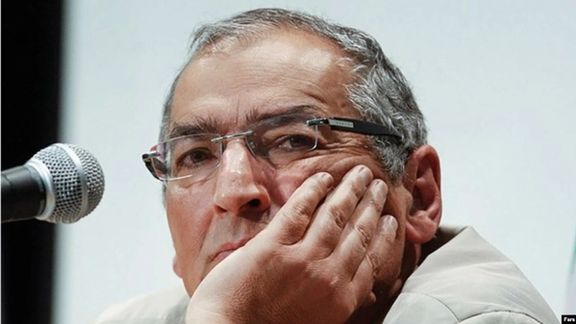
Sadegh Zibakalam, a former revolutionary who has become an outspoken citric of hardliners in Iran, has said the ongoing protests have startled the Islamic Republic's authorities.

Sadegh Zibakalam, a former revolutionary who has become an outspoken citric of hardliners in Iran, has said the ongoing protests have startled the Islamic Republic's authorities.
Zibakalam, who has been recently banned from teaching at University of Tehran for his frequent berating remarks against the government, said in an interview on Sunday that the sheer volume of the protests has surprised everyone, including the statesmen and those who are serving in the government, parliament and the judiciary.
The ‘reformist’ analyst said that the officials are not sure how to react to such a huge uprising and are confused due to a lack of appropriate responses.
The political science university professor added that he himself is surprised by the big role of universities in the protests, noting that even students andprofessors ofnumerous branches of Azad University – who usually do not participate in antigovernment rallies – have beentaking part in the nationwide demonstrations.
Stressing that he does not want to "ignore the economic problems," he said the main cause of the current wave of protests is the hatred against the so-called ‘morality’ police or hijab enforcement patrols. "The fuel and ammunition of these protests is social discontent," he added, noting that women and Generation Z are the two main groups of protesters.
The uprising was ignited over the death in custody of 22-year-old Mahsa Amini and protest rallies first erupted in her hometown Saqqez and capital Tehran and soon spread to all over the country, garnering support from Iranian expatriate communities around the world as well as foreign governments and officials.
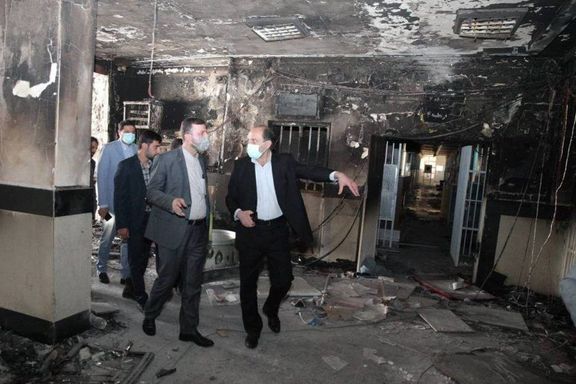
The Iranian Judiciary's news agency says the number of deaths from the fire which broke out at Tehran’s Evin prison on Saturday evening has now risen to eight.
According to the Judiciary, four more prisoners, who were in critical condition in hospital, succumbed to their injuries to bring the death toll to eight.
The Monday report has not mentioned the cause of the new deaths while on Sunday it said the first four lost their lives due to inhaling smoke.
The identities of the deceased have not been revealed yet, but the hard-liner Judiciary says they were theft-related convicts.
There is no chance in Iran for any independent investigation as to how the blaze started and exactly how many prisoners were killed. The Judiciary is a political institution fully at the service of the ruling elite, directly under Supreme Leader Ali Khamenei's control.
The large fire at the notorious prison began on Saturday evening, leaving tens of prisoners wounded while gunshots and blasts were also reported.
The prison fire infuriated the anti-government protesters once more with university students chanting slogans saying Evin had turned into a slaughterhouse.
The Evin fire caused global reactions soon after. EU foreign policy chief Josep Borrell said on Sunday that Iranian authorities are responsible for lives of all detainees, including human rights defenders and EU nationals.
German Foreign Minister Annalena Baerbock also said, “The government of Iran bears responsibility for all those imprisoned in Tehran's Evin Prison, including many political prisoners and demonstrators.”
Meanwhile, the number of signatures in an online campaign aimed at the leaders of the seven industrialized countries of the world, G7, has reached the 200 thousand mark. The petition calls on these countries to recall their ambassadors from Iran and expel diplomats and officials of the Islamic Republic.
Initiated by Kaveh Shahrouz, a lawyer and human rights activist living in Canada, on October 13, the campaign also demands the release of inmates from Iranian prisons.
However, reports from Iran show that the regime is still getting prepared to crack down on the protests and strikes. Following a strike and call for protests by the workers of Haft-Tappeh sugar factory in the southern oil-rich Khuzestan province, it was reported that the employer's agents are attempting to create division among the workers to prevent any gatherings.
However, the workers’ unofficial union social media channel has called on members to be alert and participate in a protest on Tuesday morning.
Iran’s oil workers last week joined the anti-regime protests. Workers of refineriesin southern oil-rich provinces of Bushehr, Khuzestan and Hormozgan such as Abadan Refinery and the petrochemical facilities in Asalouyeh, off the coast of the Persian Gulf, have been on strikes since last Monday.
This comes as the uprising of Iranians against the clerical regime draws more support from the diaspora and the international community.
In one of the latest reactions, the famous American pop star Britney Spears has expressed support for the protests. “Me & my husband stand with the people of Iran fighting for freedom,” Spears wrote on her Twitter account on Sunday.
The pop star's tweet came after her Iranian-American husband Sam Asghari, condemned the Iranian regime as "terrorists" last month.
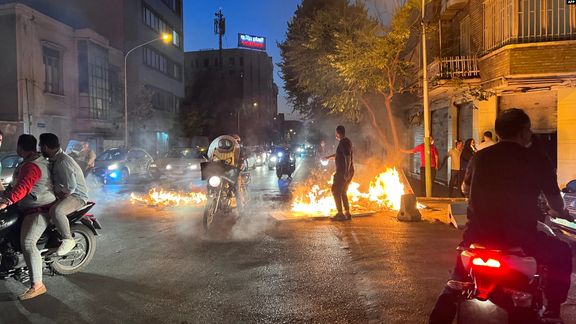
Sunday protests across Iran were mainly focused on reactions to the mysterious fire at Tehran’s notorious Evin prison and the death of a schoolgirl in the northwestern city of Ardabil.
Amid a nationwide uprising ignited by death in custody of 22-year-old Mahsa Amini, the protest rallies started at several universities across the country Sunday morning with students at University of Tehran chanting, "Tehran has turned into a Prison, Evin has turned into Slaughterhouse." At least four people died Saturday evening as a large fire spread in Evin Prison while gunshots and blasts were heard.
"Another Cinema Rex Fire Happening. Enough Is Enough, People, Join Us," Tehran University students were heard chanting, referring to the deadly 1978 fire at Cinema Rex of Abadan in southern Iran which killed some 400 people and intensified the 1979 Revolution.
Students at Azad University of Karaj were chanting, "Neither Gaza nor Lebanon, I Sacrifice My Life for Iran" during their rallies at the campus, in defiance of the authorities who have threatened students with expulsion if they continue their protests.
EU foreign policy chief Josep Borrell said on Sunday that he is following evolving reports on the situation in Evin prison, noting that Iranian authorities are responsible for lives of all detainees, including human rights defenders and EU nationals.
Borrell said that he expressed his “most serious concern” to Iranian Foreign Minister Hossein Amir-Abdollahian, saying that the EU “expects maximum transparency on the situation.”
Echoing the sentiments, German Foreign Minister Annalena Baerbock said, “The government of Iran bears responsibility for all those imprisoned in Tehran's Evin Prison, including many political prisoners and demonstrators.”
Protests were also reported at universities in the northeastern city of Bojnourd, the northern city of Babol, and several cities in the southwestern provinces of Khuzestan and Lorestan. Some clashes were also reported in the central city of Yazd, with a population known to be sympathetic to the Islamic Republic.
Outraged by the death of a schoolgirl, citizens of the city of Ardabil also held protest rallies, which broke into clashes in some areas.
School officials in Ardabil tried to force the students to sing the propaganda song “Hello Commander” in praise of Iran’s ruler Ali Khamenei Wednesday, but when some students refused, government agents showed up, beating and assaulting the girls. One student, identified as Asra Panahi, reportedly died of her injuries at the hospital while another one is in critical condition.
Tehran was also the scene of sporadic clashes and demonstrations, with teargas and gunshots used to disperse the protests.
According to videos on social media, a group of residents in Tehran's Ekbatan township held a protest march in the evening, with slogans likening Iran’s Revolutionary Guards to ISIS terrorists, while people residing in the Nazi Abad neighborhood clashed with security forces who tried to disperse their demonstration.
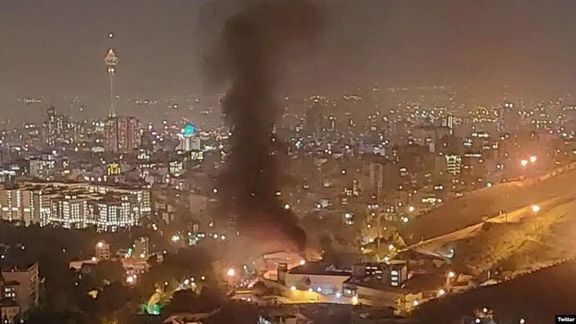
Following a massive blaze at Tehran’s Evin Prison Saturday, some journalists and people on social media accused the Islamic Republic of setting the prison on fire intentionally.
An early and extended furlough to Mehdi Hashemi Rafsanjani, one of the sons of former Iranian president Akbar Hashemi Rafsanjani, has been cited as evidence to support the conjecture.
Yasser Hashemi Rafsanjani, the youngest son of the former president who for years was a kingmaker in the Islamic Republic, revealed the information about his brother’s unusual furlough in a Clubhouse discussion on Sunday.
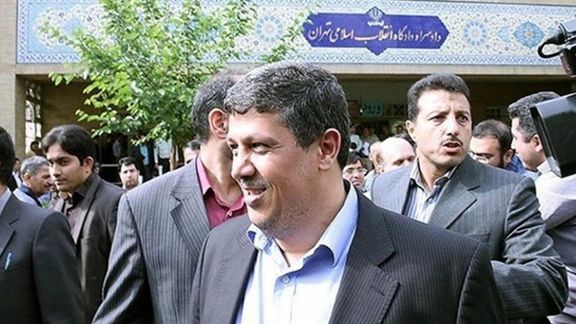
He said that his brother Mehdi – who is serving a 10-year sentence over financial corruption in Evin – was usually let out of the prison on Wednesdays on a two-day leave and had to be back in the prison on Fridays. But this week, he was sent home early and told not to come back until after Saturday, when the fire broke out in the prison.
This has added to speculation that the prison blaze might have been an intentional act by the government, although others believe it could have been a coincidence.
Sources in Tehran told Iran International Sunday morning that four of the inmates had been seen in body covers after the incident, a report later confirmed by Iran's judiciary. Over 60 inmates were also injured in the incident, four of them in critical condition.
Human rights advocate and lawyer Mostafa Nili, in a tweet Sunday said some of the inmates have been removed from Ward Eight, where both political and financial prisoners are held. According to Nili and others, political prisoners in Ward Four were only affected by tear gas and none have been taken away.

Forces from Iran-backed Lebanese Hezbollah group and Iraq’s Shiite militia Hashd al-Shaabi have been seen helping Iran’s Basij paramilitary forces in their crackdown on Iranian protesters.
According to a report by the Jerusalem Post on Sunday, plainclothes men with Lebanese-accented Arabic speakers were seen trying to help Iranian police, Revolutionary Guards, and Basij to suppress the protesters in various cities, including in the capital of Tehran.
Videos of the Arabic-speaking individuals violently beating Iranian protesters have earlier surfaced on social media. Iran International cannot independently verify the authenticity of the claim.
However, earlier in October, Hezbollah’s Secretary-General Hassan Nasrallah promoted the Islamic Republic’s propaganda line, trying to deflect blame over the death of Mahsa Amini, the 22-year-old whose death sparked the uprising.
Referring to Amini’s death as a “vague incident,” Nasrallah -- whose militant movement was created by Iran in early 1980s and has been receiving money and weapons from Iran ever since, said her death was a plot to weaken the Islamic Republic and create regional tensions.
Hezbollah is also using all its propaganda tools to show support for the Islamic Republic and misrepresent the current nationwide protests in Iran, organizing rallies in support of the regime in Tehran with students from its private educational system – the Mahdi schools.
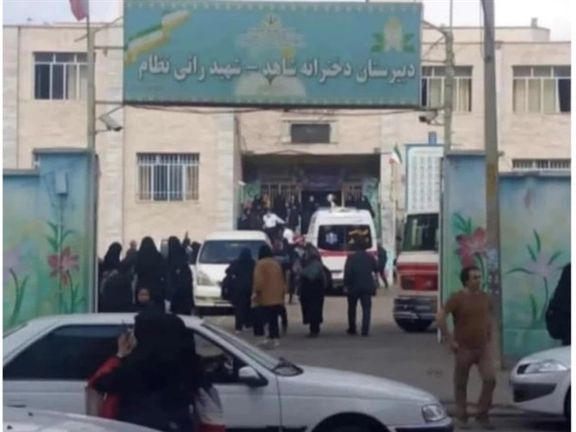
An Iranian teachers union has called for the resignation of the Islamic Republic’s Education Minister Yousef Nouri amid arrests and killings of many students across the country.
Condemning the violence in a statement on Sunday, the Coordination Council of Iranian Teachers’ Trade Associations, the body that has organized numerous nationwide protest rallies and strikes in the past few years, described the minister as an “incompetent and good-for-nothing element.”
"Unfortunately, in the last week, we witnessed the brutal attack of security forces and plainclothes on educational centers in various cities of the country, including schools in Kordestan province, Gohardasht and Mehrshahr near the capital Tehran, Orumiyeh (Urmia) and Ardabil in northwestern Iran and the northern city of Rasht,” the statement read. “Creating terror, the security forces arrested several students and transferred them to unknown places," it added.
The latest case was the attack on a school in Ardabil, where school officials tried to force the students to sing the propaganda song “Hello Commander” in praise of Iran’s ruler Ali Khamenei, but when some students refused, government agents showed up, beating and assaulting the girls. One student, identified as Asra Panahi, reportedly died of her injuries at the hospital while another one is in critical condition.
On Saturday, hardliner news agencies published a video of an interview with Asra Panahi’s uncle in which he said she has died of a congenital heart condition.
Amid nationwide protests that have even mobilized Iranian high school students, the Islamic Republic authorities are removing photos of the Supreme Leader from classrooms in fear of students damaging the portraits.